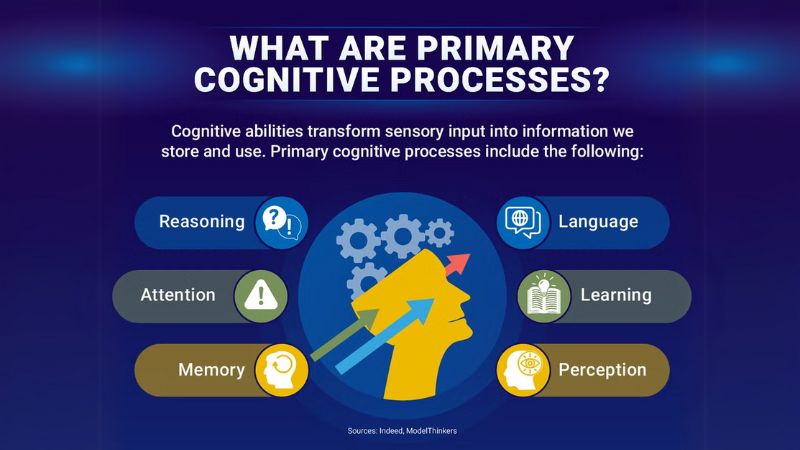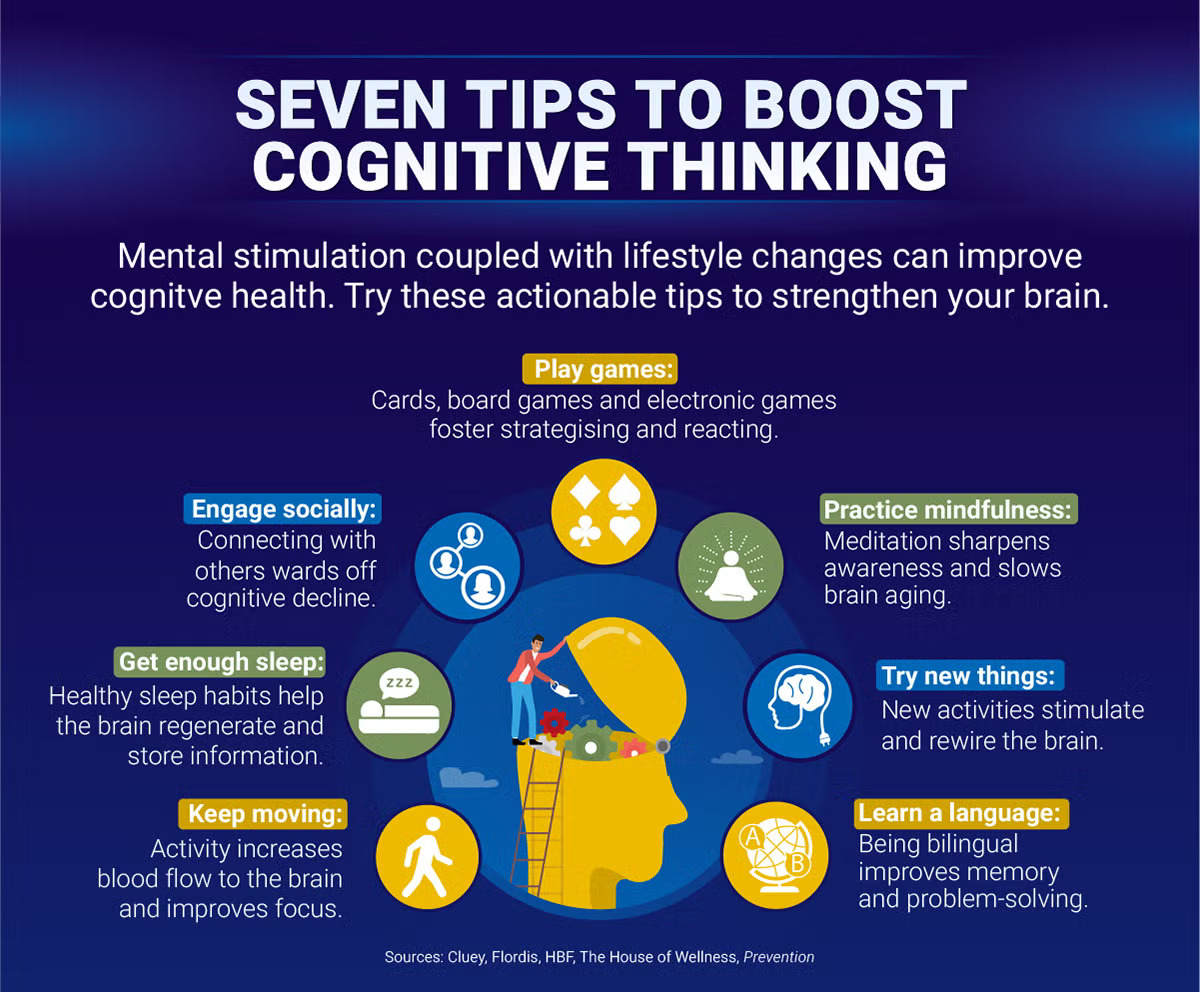7 tips for improving cognitive thinking

Compared with any other species on Earth, humans have evolved by leaps and bounds to create the world we now live in. How? A large part of this has to do with our cognitive abilities, otherwise known as our ability to think, know, remember, judge, and solve problems. Cognitive skills are essential in helping us become reflective and self-aware individuals who learn from our mistakes and strive to improve ourselves and the world around us continually.
Throughout our lives, our brains are constantly changing and developing, and it’s essential to continually improve our cognitive thinking skills, especially as we approach our later years, as these skills are essential in preventing mental decline.
If you are interested in further developing your understanding of human development and cognition, our Graduate Diploma of Psychology (Bridging) could be for you. This APAC-accredited degree will empower you to understand contemporary psychology disciplines and fast-track your education with 100% online study.
The role of cognitive thinking
Optimized cognitive thinking is important for living our best lives at any stage, as it enables us to perform better when studying and at work. Understanding and purposefully developing these skills enables us to achieve our potential and maximise our mental and physical health.
Practices such as these can help improve cognitive thinking:
- Staying active
- Getting enough sleep
- Engaging socially
- Practising mindfulness
- Trying new things
- Learning a new language
- Playing games.
Understanding how humans learn and retain information and how to implement these practices can help improve cognitive thinking and processes.
What is cognitive thinking?
Cognitive thinking is the mental process that humans use to think, read, learn, remember, reason, pay attention, and, ultimately, comprehend information and turn it into knowledge. Human beings can then turn this knowledge into decisions and actions.
Cognitive thinking occurs in the brain using brain cells called neurons. Neurons interact with each other via electrical signals and then form thoughts through a chemical process. These processes take only fractions of a second, yet they have an incredible impact on how well we function at school, at work, and in life in general.
Every day, cognitive skills play an important part in processing new information – for example, learning new skills or performing new tasks. Cognitive thinking helps human beings grasp, retain and use information, and this type of thinking is essential to be successful in school, at work and in life.
We know so much about cognitive thinking mainly because of the work of cognitive psychologists who investigate the process of human thought. Cognitive psychologists are currently investigating many topics that can illuminate how we think and make connections.
‘Fast’ and ‘slow’ thinking
Humans have numerous higher-order cognitive thinking skills. These skills involve the ability to reason and make decisions, and humans use them every day to apply logic to problems and make choices using data and advanced reasoning.
Psychologists Daniel Kahneman and Amos Tversky first researched this type of thinking. They called it ‘slow’ thinking, as it takes more time and energy to think through and apply reasoning to a problem. This type of thinking, they argued, was fundamentally different from what they called ‘fast’ thinking (which much of the animal world uses) and is more automatic and intuitive. This type of thinking results in ‘good enough’ decisions.
Cognitive biases
Another important research topic in the field of cognitive thinking is cognitive biases. Cognitive biases refer to humans’ tendency to be biased towards stereotypes or information that best or most easily serves them. Such biases often occur subconsciously, so the focus of cognitive psychologists in this area is to help isolate and understand these biases to think more objectively.
Cognitive psychologists are interested in many different types of biases.
Anchoring bias
Anchoring bias causes people to believe or get attached to the first available piece of information, and then unconsciously use it to influence their decision-making process, even when that information is incorrect.
This bias can lead to poor decision-making and flawed judgement, especially if they haven’t taken the time to think through the decision.
Confirmation bias
In general, people want to believe what they already believe. Confirmation bias ensures that this occurs, as the brain searches for and focuses on information that supports beliefs, while dismissing other facts or information that goes against those beliefs, regardless of its relevance.
Negativity bias
In general, people enjoy positive events but are more impacted by negative events and outcomes. For this reason, they’re more likely to pay attention to negativity than positivity.
Negativity bias hence refers to how negative events and circumstances influence more people, and how they use these memories to make decisions.
Actor-observer bias
Actor-observer bias refers to how individuals see themselves in situations, as opposed to how they see others.
Individuals who are actors in any particular situation are more likely to see their actions as a result of external and situational factors. On the contrary, when the same individuals are observing other people, they’re more likely to perceive their actions as based on internal factors. This can lead to a lack of self-awareness.
The halo effect
The halo effect is a type of bias characterised by the first impression that individuals may have of someone or something. For example, if they see someone beautiful, they’re more likely to believe that the person has other positive characteristics – successful, smart, confident.
The opposite can be true if individuals have a negative first impression of someone; they’ll believe that they have other negative traits.
Cognitive processes and mental health
One particularly interesting research area for cognitive psychologists is how cognitive thinking can be used to assist with mental health via cognitive behavioural therapy (CBT). This type of therapy can be effective in treating anxiety and depression.
CBT works by helping individuals identify, understand and challenge unhelpful thoughts, and then by helping them learn practical strategies that enable them to bring about positive changes in their lives. CBT is particularly helpful in assisting individuals to understand how cognitive thinking might affect their mood. CBT treats thinking like any other habit that can be positively influenced and changed.
Cognitive processes and skills
Fundamentally, cognitive processes are what enable us to think, acquire knowledge, remember, read, pay attention and make critical decisions. Cognitive processes and skills are vital for processing new information and ensuring that the brain understands the world and creates useful data stores.

Cognitive processes
The six primary cognitive processes are:
1. Thought
As one of the foundational cognitive processes, thought is essential in helping individuals make decisions, solve problems and access higher-order reasoning skills that help them assess the merits of the options available to them.
2. Attention
As the name suggests, attention is how well individuals can stay focused on the task at hand, regardless of what distractions surround them. Attention is related to memory because good attention leads to better short- and long-term memory recall.
3. Language
Language and language development cognitive processes refer to individuals’ ability to understand and express their thoughts and feelings through speaking or writing.
Articulating thoughts via language is an important cognitive process as it’s essential for communication.
4. Learning
Throughout life, human beings are constantly taking in new information and learning. Learning is the cognitive process associated with understanding new things, synthesising information and integrating it with past experiences to master new skills or see things from a different perspective.
5. Perception
Perception is the cognitive process that allows individuals to take in sights, sounds, smells and information via touch and to mentally process this information and respond to it.
Perception is both how individuals process initial information acquired via their senses in their immediate environment, as well as how their thoughts on it change over time.
6. Memory
Memory is the cognitive process that relates to how well individuals recall information, both in the short term and in the long term. Poor memory can affect an individual’s knowledge of facts, dates, times, tasks and people. A good memory is critical for success both at work and in everyday life.
Cognitive skills
Cognitive skills use cognitive processes, so individuals can better acquire knowledge and make important decisions. By practising, individuals can improve their cognitive skills.
Here are five essential cognitive skills.
1. Critical thinking
Critical thinking helps individuals evaluate information and conduct logical thought processes. Critical thinking skills enable people to analyse situations and find the best solutions, even if these solutions are not straightforward or obvious.
2. Quantitative skills
Quantitative skills involve the use of mathematics and statistics to help individuals turn ideas into measurements and to use these measurements to make important decisions. The use of quantitative skills helps people be more objective in their decision-making and is particularly useful in technology and science-based roles, as well as in everyday life.
3. Logic and reasoning
Logic and reasoning are the skills required for individuals to solve difficult problems based on the information available. Logic and reasoning help individuals think through the various options available to them and help them weigh the merits of each. Strong logic helps people understand what tasks to do and in what order.
4. Emotional intelligence
Emotional intelligence, also known as emotional quotient (EQ), helps individuals understand other people’s emotions and also helps them manage stress while reacting most appropriately. Emotional intelligence is critical to maintaining positive relationships.
5. Focused attention
Focused attention helps individuals prioritise tasks, especially when several competing priorities exist. This essential cognitive skill helps people stay focused and organised.
Learning, memory and cognition
Cognitive processes don’t exist in a vacuum. They’re all interconnected, and cognitive processes affect critical functions such as memory and learning.
To understand learning, memory and cognition, it’s important to understand how the brain learns and remembers.
How the brain learns
Whenever the brain is presented with new information, new connections form between neurons. If that information is reinforced, the connections will grow strong, but if it isn’t, the connections weaken. Learning takes place when new connections are formed between a network of neurons, and forgetting takes place when these connections fall away.
Connections within the brain are formed when two stimuli are paired together. For example, when children observe how adults behave, they use this behaviour as a model for their own.
How the brain remembers
Memory is the process in which the brain encodes, stores and retrieves information. This process helps guide individuals’ behaviour as they remember facts and experiences from the past and call these to mind when making decisions about what they should do in the future. Memory includes both what people consciously remember and ingrained knowledge that they may be unconsciously aware of.
Many different types of memory exist, from vivid recollections from someone’s past (otherwise known as long-term memory) to functional or procedural memory that enables individuals to perform everyday tasks (otherwise known as working memory).
Cognitive learning theory
Understanding how people learn is an important research area for cognitive psychologists. One theory that helps them understand this is cognitive learning theory.
Cognitive learning theory uses metacognition, or the idea that individuals think about their own thinking, to explain how people learn throughout their lifetimes. Cognitive learning theory focuses on individuals’ internal cognitive structures and seeks to understand how individuals assign meaning to new information and events. Fundamentally, cognitive learning theory can be used to help people enhance their memory retention and their overall productivity by understanding their thought processes while they learn, meaning that their learning can be guided more effectively.
Stages of cognitive development
According to the developmental psychologist Jean Piaget, children move through four stages of cognitive development as they become adults. At each stage, a different level of metacognition, or ‘thinking about thinking’, is possible. Understanding these stages is important in understanding what individuals are capable of learning and understanding at any point in their lives.
Stage 1: Sensorimotor stage (birth to two years old)
In the sensorimotor stage, infants and toddlers acquire knowledge through their senses and by handling objects. Their development mostly takes place through basic reflexes and motor responses, including sucking, grasping, looking and listening.
In this stage, they begin to realise that they’re separate beings from the rest of the world, and they also begin to understand cause and effect.
Stage 2: Preoperational stage (two to seven years old)
In the preoperational stage, language begins to develop. Children in this stage start to use words and pictures and understand the relationship between language and objects in their everyday lives.
They do, however, struggle to see things from the perspective of others and think in very concrete terms.
Stage 3: Concrete operational stage (seven to 11 years old)
In the concrete operational stage, children become better at using logic and at understanding the perspective of others. They begin to understand how to have more complex conversations and can use inductive logic (reasoning from specific information).
Stage 4: Formal operational stage (12 years old and up)
In the formal operational stage, the final stage of cognitive development, children and young adults increase their use of logic and can understand abstract ideas. They’re also capable of solving more complex problems and can think about life in moral, philosophical, ethical and social ways.
Collaborative learning
Cognitive learning theory can also be applied in a workplace setting to help individuals excel and succeed in their careers via workplace learning.
Instructors in workplaces use the following cognitive learning theory concepts:
Social cognitive theory
Social cognitive theory explores how people adjust their behaviour over time to create goals.
Instructors can use different techniques to help individuals positively adjust their behaviour and learn more effectively, including the following:
- Positive and negative reinforcement
- Reciprocal determinism
- Observational learning
- Self-regulatory capability
- Emotional coping.
Cognitive behavioural theory
Cognitive behavioural theory seeks to explain how thoughts and feelings can influence behaviour, and how, in turn, these thoughts and feelings can affect learning.
By using cognitive behavioural theory, instructors try to assist learners to have a positive mindset, so they can learn most effectively and retain information. Instructors endeavour to motivate and incentivise students and ensure that they can focus in the classroom.
Implicit and explicit learning
The concepts of implicit and explicit learning help instructors structure their learning to maximise the amount of information learners can retain.
Implicit learning is learning that occurs without effort, whereas explicit learning does require effort. Instructors typically seek to ensure that 70 per cent of students’ learning is ‘on the job’ (or more implicitly, while gaining experience), with 10 per cent of learning being explicit classroom learning and 20 per cent encompassing social learning, which can be both implicit and explicit.
Tips for boosting cognitive thinking
Throughout an individual’s lifetime, cognitive thinking plays a big part in health, happiness and success. Boosting cognitive thinking can also have many other benefits, including that it:
- Helps individuals make more objective decisions.
- Improves productivity at work.
- Enables a richer social life.
- Provides an enhanced ability to learn.
- Encourages a better memory.
- Delays the onset of cognitive decline.
With all these benefits, it’s important to invest in improving cognitive thinking. Here are seven tips to boost it.

1. Stay active
Research has shown that physical activity improves cognitive performance and memory, including the ability to learn, manage stress and make better decisions. The reason for this is that exercise improves blood flow to the part of the brain that’s responsible for memory (the hippocampus).
Tips for staying active to enhance cognitive thinking:
- Keep track of daily steps, using a pedometer or fitness tracker.
- Take daily walks.
- Do group exercise.
2. Get enough sleep
Good quality sleep, and enough of it (ideally seven to nine hours each night), helps put people in a better mood and gives them the energy they need for the day. Sleep also helps sharpen the brain by flushing out toxins that build up during the day.
Sleep is also critical for helping store memories, solve problems and concentrate.
Tips for getting enough sleep to enhance cognitive thinking:
- Avoid using a screen before bedtime (including phones and laptops).
- Don’t drink caffeinated beverages after 2 pm.
- Sleep according to a natural sleep cycle.
3. Engage socially
Engaging regularly with others, either via work, socialising or even virtually, helps keep an individual’s brain active. The cognitive skills required to interact, including using language and memory, are critical to ensuring continued brain health.
Tips for engaging socially to enhance cognitive thinking:
- Stay in touch with friends and family regularly via phone or in person.
- Make regular times to visit people.
- Where possible, live near other people.
4. Practise mindfulness
Emotional wellbeing can affect an individual’s health in many ways, and stress, anxiety and depression can take a toll on cognitive thinking abilities, potentially leading to impaired memory and cognitive decline.
To combat stress, it’s important to practise mindfulness, including taking time out to practise it, as well as identifying the root cause of stress and developing effective strategies to cope.
Tips for practising mindfulness to enhance cognitive thinking:
- Take time daily to meditate.
- Regularly walk in nature.
- Write in a gratitude journal.
5. Try new things
One great way to improve cognitive thinking is to try new things. When trying something new, new connections are formed in the brain, which helps to keep the brain healthy and provides a new and exciting challenge for the individual.
Tips for trying new things to enhance cognitive thinking:
- Make an effort to regularly try a new hobby or activity.
- When doing routine tasks, for example, taking a walk, try a new route.
- Try varying other daily habits, for example, cooking new meals.
6. Learn a new language
Learning a new language can greatly assist cognitive thinking as it helps individuals understand how to communicate in a completely different way. It also gives insights into different cultures and perspectives.
Contrary to popular belief, individuals can learn a new language at any time of their lives by practising and exercising patience.
Tips for learning a new language to enhance cognitive thinking:
- Download a language application and regularly commit to practising.
- Attend a language school.
- Travel and live overseas, if possible.
7. Play games
Board games, card games and video games can all help activate higher-order cognitive skills, as they involve socialising, strategising, reasoning, solving problems and many other skills.
Games that are particularly good for enhancing cognitive thinking skills include the following:
- Crossword puzzles
- Sudoku
- Chess
- Bridge.
Improve your cognition for a better life
With enhanced use, your brain will become stronger and work better. Investing in increasing cognitive thinking is critical for better performance at work and in life. It can help you make better decisions, be more productive, have a better social life and, importantly, prevent cognitive decline as you age.
Ultimately, understanding cognitive thinking can give you insight into how you think and why you think the way you do. Armed with this information, you can objectively assess and work towards your life goals.
Want to learn more about human cognition and behaviour? Our Graduate Diploma of Psychology (Bridging) will give you the opportunity to learn about contemporary theories of psychology, including social and cognitive psychology. Reach out to our friendly Enrolment Advisors to find out more on 1300 535 919 or email learn@online.jcu.edu.au.
Find out more about JCU’s online Graduate Diploma of Psychology (Bridging).
Get in touch with our Enrolment team on 1300 535 919





